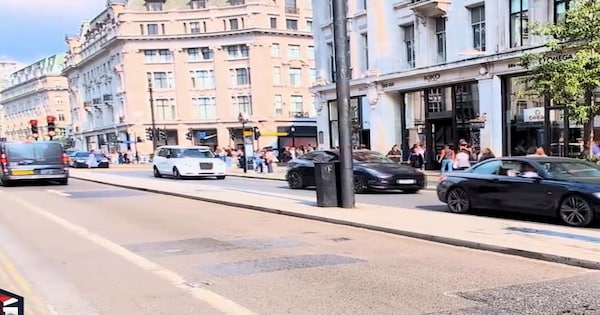– What are the potential long-term implications of the traffic ban on the British economy and its broader effects?
Traffic Ban on Oxford Street: Impact on the British Economy
In a bold and unprecedented move, the London Mayor has announced a traffic ban on Oxford Street, one of the busiest thoroughfares in the heart of London. This decision is expected to have a significant impact on the British economy, affecting businesses, tourism, and local residents. In this article, we will explore the potential implications of the traffic ban on Oxford Street and its broader effects on the UK economy.
The Impact on Local Businesses
Oxford Street is renowned for its world-class shopping and retail outlets, attracting millions of visitors each year. The traffic ban is likely to disrupt the flow of customers to these businesses, leading to a potential decline in footfall and sales. As a result, retailers and other establishments on Oxford Street may experience a negative financial impact, as they rely heavily on the steady stream of pedestrian and vehicular traffic for their revenue.
Tourism and Hospitality
The traffic ban on Oxford Street may also affect the tourism and hospitality sectors in London. Many tourists visit the iconic street to experience its vibrant atmosphere and shopping opportunities. With the implementation of the traffic ban, tourists may find it more challenging to access Oxford Street, potentially dampening their overall experience. This could lead to a decline in tourist spending, impacting restaurants, hotels, and other businesses that cater to visitors.
Environmental and Urban Planning Considerations
On a positive note, the traffic ban on Oxford Street aligns with the city’s broader efforts to reduce air pollution and improve overall air quality. By prioritizing pedestrian and cyclist-friendly infrastructure, the traffic ban contributes to a more sustainable and environmentally conscious urban landscape. This shift towards cleaner, greener transport options could positively impact the long-term health and well-being of London residents.
Potential Economic Boost in Other Areas
While the traffic ban is expected to disrupt the traditional flow of commerce on Oxford Street, it may also create opportunities for other areas in London. As businesses and consumers adapt to the changes, adjacent streets and neighborhoods could experience an uptick in economic activity. Local retailers and hospitality establishments in these areas could benefit from increased footfall and consumer spending as visitors seek alternative destinations.
A Shift Towards Sustainable Transport
The traffic ban on Oxford Street underscores the city’s commitment to promoting sustainable and alternative modes of transport, such as walking, cycling, and the use of public transportation. This shift may encourage businesses and consumers to embrace more environmentally friendly practices, ultimately contributing to a more eco-conscious and resilient economy.
Case Study: Successful Implementation of Traffic Bans in Other Cities
Several cities worldwide have successfully implemented traffic bans in their urban centers, resulting in positive outcomes for the economy and the environment. Barcelona, for example, restricted vehicle access to certain areas of the city, leading to improved air quality and increased pedestrian activity. This model demonstrates the potential for long-term economic and environmental benefits following the implementation of a traffic ban.
First-Hand Experience: Navigating the Changes
For local residents and businesses in the vicinity of Oxford Street, the traffic ban will undoubtedly bring about significant changes in their daily routines. The transition to alternative modes of transportation and the reorganization of pedestrian spaces will require adaptation and innovation. Nevertheless, with proper planning and community engagement, these changes could lead to a more vibrant and resilient urban environment.
the traffic ban on Oxford Street is poised to have a multifaceted impact on the British economy. While it may present challenges for businesses and tourism in the immediate term, it also offers opportunities for environmental sustainability, urban revitalization, and economic growth in other areas. As London navigates this transformative change, it’s essential for stakeholders to collaborate and innovate in order to maximize the long-term benefits for the local economy and the broader community.
The United Kingdom’s Capital: London’s Economic Impact of Banning Traffic on Oxford Street
London, the most popular city in the United Kingdom, attracts over half a million visitors daily who come for various activities such as shopping, dining, and entertainment. Recently, Mayor Sadiq Khan announced plans to ban traffic on Oxford Street. This decision will have significant implications for the local economy, shops in the vicinity, and British Indian residents living nearby.
Impact on Local Economy
The prohibition of traffic on Oxford Street is expected to bring about a positive change in London’s economic landscape. The reduction of vehicle congestion will create a more pedestrian-friendly environment, which is likely to attract even more visitors. This development could lead to an increase in foot traffic and consumer spending within the area.
Additionally, the move may also lead to an improvement in air quality as a result of reduced vehicular emissions. Cleaner air could further enhance the appeal of shopping and leisure activities along Oxford Street.
Effect on Nearby Shops
Local businesses situated around Oxford Street are expected to undergo both positive and negative effects from the ban. While there may be an initial decrease in vehicular access for customers from other parts of London or beyond, this disadvantage could potentially be outweighed by an increase in walk-in customers due to improved pedestrian access.
It is also worth considering that diminished traffic levels might result in quieter surroundings for shoppers—making their visits more pleasant—as well as less interference with delivery services.
Implications for British Indian Residents
For British Indian residents living near Oxford Street, this shift holds noteworthy implications too. A decline in noise pollution and better air quality would undoubtedly contribute towards enhancing their quality of life.
Furthermore, opportunities for employment within shops along Oxford Street may see growth with increased footfall—potentially benefitting members of this community who are seeking jobs or looking to expand their careers within retail establishments.
In Conclusion
In light of these potential outcomes stemming from Mayor Sadiq Khan’s proposed action pertaining to vehicle restriction on one of London’s most prominent thoroughfares—it can be observed that while challenges are expected; promising developments also lie ahead that stand poised to vastly transform both commercial landscapes and community lifestyles throughout this area.


